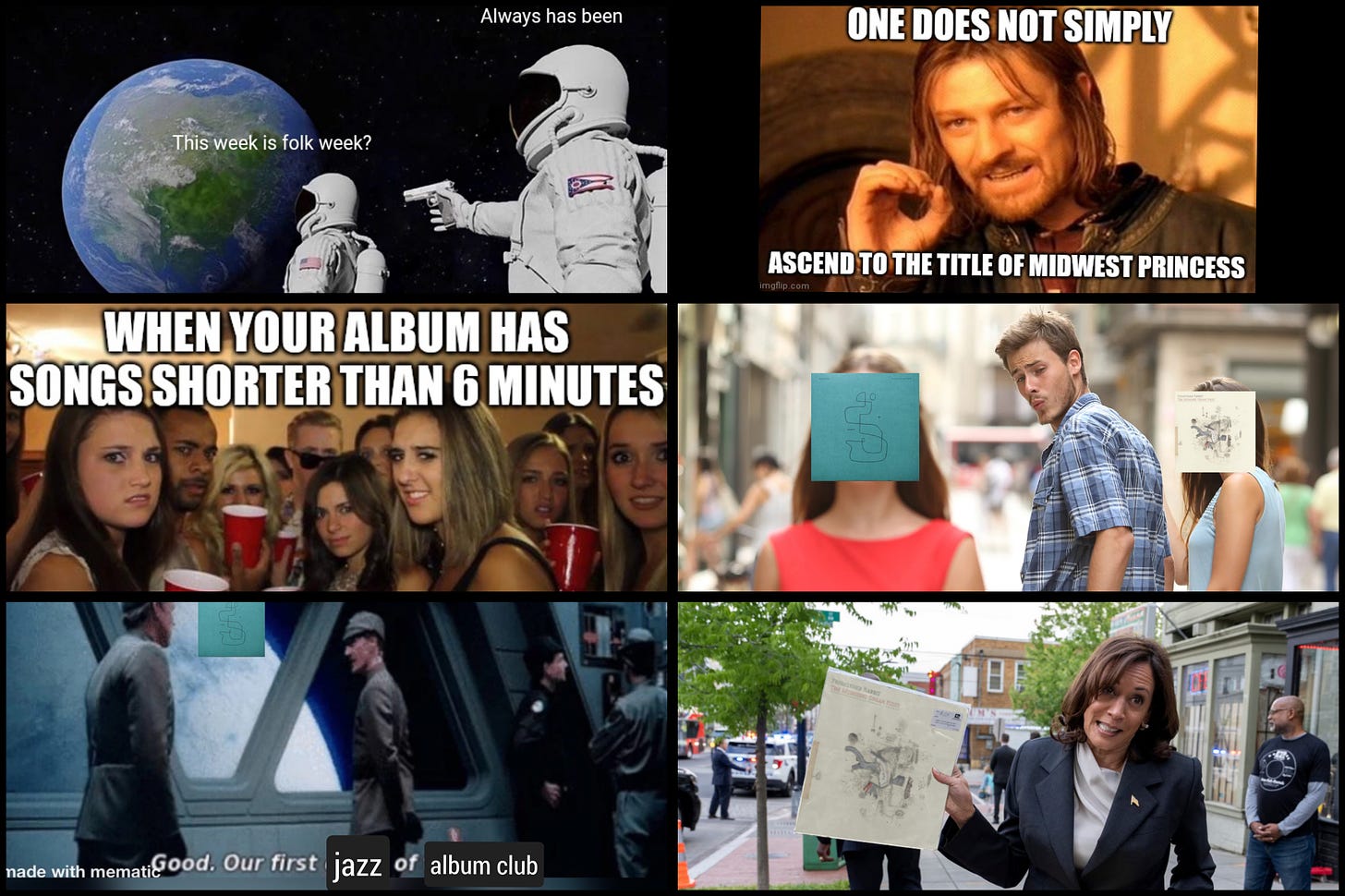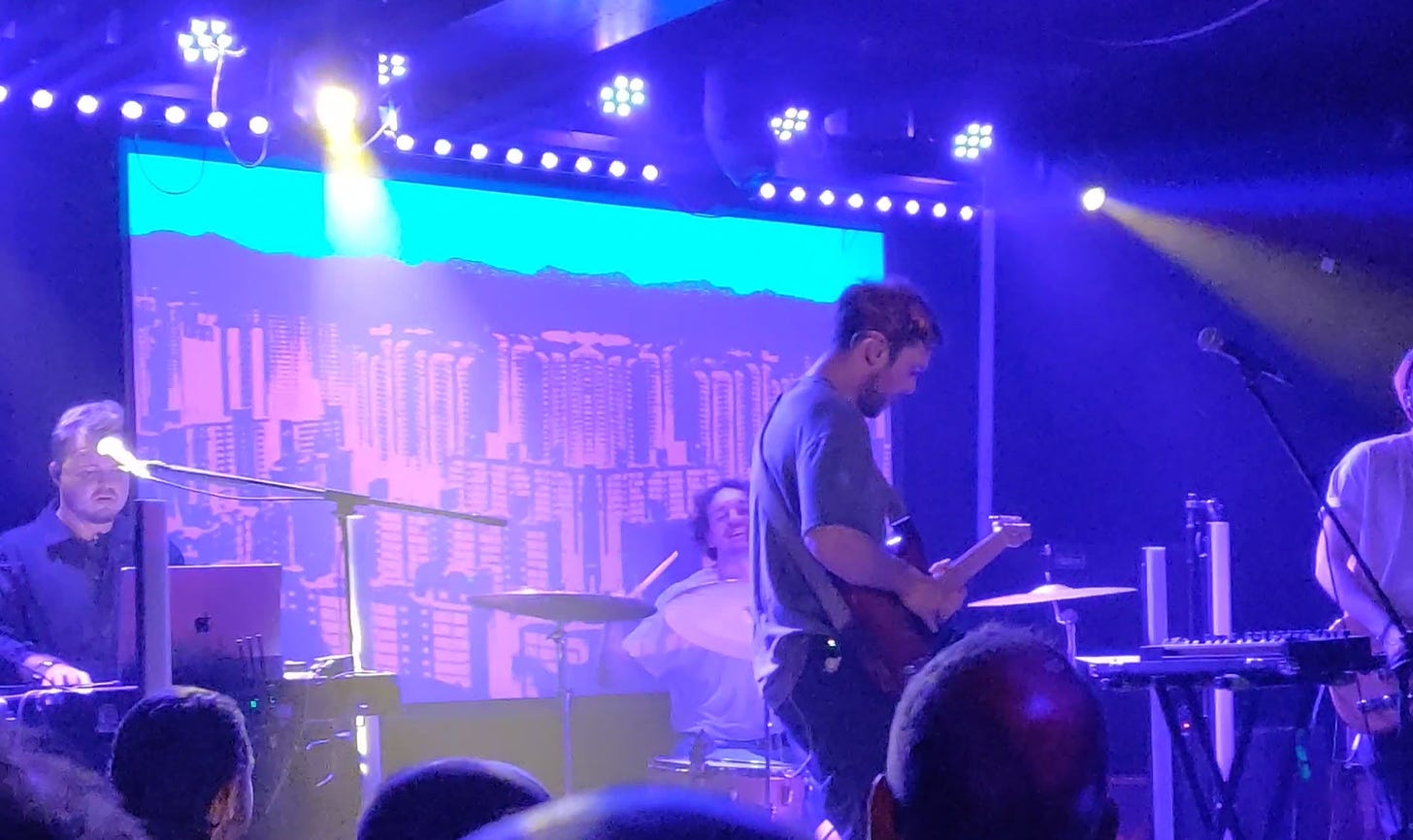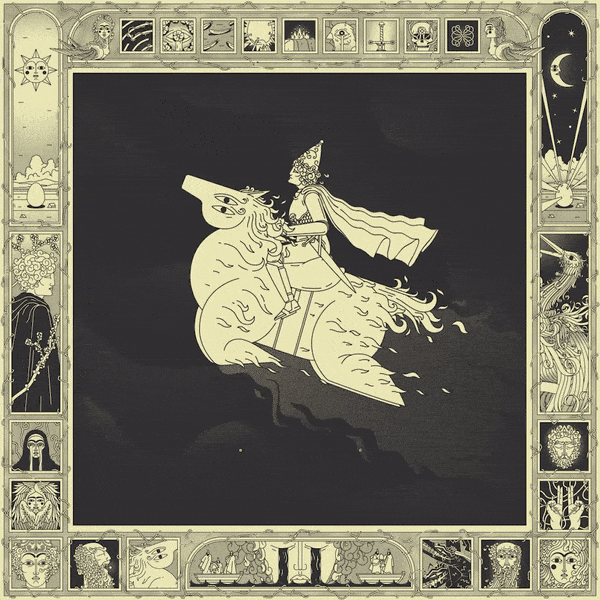October 2024: I Leave You Maximalism
The joys of Album Club; Overhead, The Albatross, Codices, Million Moons; Tigran Hamasyan
Mega playlist this month - grab a cuppa, boot up Spotify / TIDAL, and enjoy.
Breaking the first and second rules of Album Club
For the past nine weeks, I’ve taken part in an album club run by my good friend Calum (Emperors of the Moon, Foul Weather Call). The concept is pretty similar to a book club - everyone participating nominates an album; each week, one of the albums is selected, you listen to it (usually three times), and share your views. As a remote club with a busy group of folks, the “view-giving” is via a written review.
Initially, I had some trepidation about my involvement. An uncharitable perspective (jokingly espoused) is that it’s a weekly essay deadline. Longtime subscribers here will know of my delay in putting together these newsletters (on a monthly schedule, no less - no excuse!), generally with an essay and two reviews - the prospect here was to do an album review a week on top of that. And I’ve not participated in a book club before, but I assume the quality of such groups heavily depends on both the material suggested and the dynamics of the group.
I need not have worried. The selection of albums has been eclectic, interesting, occasionally exceptional, and often from artists or genres I would never have otherwise explored. Some of my highlights have been the Americana country rock of Jason Isbell & The 400 Unit, the challenging folk-pop of Joanna Newsom’s Divers, and the all-pervasive but off-my-radar chart bangers of Chappell Roan (easily the best opening one-two punch of an album I’ve heard in a minute). It’s also allowed me to evangelise post-rock to a new audience, sharing one of the outstanding examples of the genre in Departure Songs by We Lost The Sea (currently third in the club rankings, behind Ms. Roan and Mr. Isbell).
It’s been a creative delight to witness how people approach their reviews of the albums. One member has been drawing hilarious comic strips to convey their impressions. There are exciting perspectives from various musical backgrounds (a fair few folk musicians, but there are a couple of metalheads to keep me company, too). It’s a large group, and there was the concern it might fizzle away in participation after the first few weeks. Still, the hit rate for reviews has remained stubbornly high as the weeks march on. One noticeable and brilliant factor has been observing the quality and insight of the reviews increasing week-on-week. Writing, like anything, is a muscle that improves with exercise, and I can definitely feel my abilities improving; it remains a delight to see that matched and surpassed by others in the group.
It started with about 16 or so people, but the group has been expanding via referral, growing the list of albums; as such, the endpoint is still in flux. But it has undoubtedly been a roaring success. I initially started this blog as an exercise to do more writing, to translate my music fandom into something tangible & creative that required less effort and more immediate returns than learning how to mix and produce my own music1. Album Club has given me a new outlet for this, one that feels a little less stochastic in its engagement level than this platform did in the early days. It’s also renewed my confidence that I can write at a decent level about music, broadened my horizons and appreciation for the form of the album as a musical artefact, and given me the energy and pace to pick up Even More Writing (more on that below).
So - I can highly recommend the concept of Album Club to you all, whether it be an (admittedly intense) weekly writing exercise or, say, a monthly in-person/Zoom discussion of what you’ve been listening to recently. Get together with some friends, pick some exciting music, and discuss it however works for you. In the meantime, I have a ton of reviews of albums that I’m keen to share more widely - so I will start uploading some of the reviews in future editions to email subscribers. Hit that subscribe button below, and don’t miss a word!
One other note - I’m now writing for Distorted Sound Magazine! Distorted Sound has produced excellent journalism on rock and metal music for the past decade, and it’s an honour to join their writing team. Check out my first published review of the debut Civil Service album here. I’m hoping to maintain the usual operating procedure of this newsletter for the time being - including the somewhat intimidating 50 Best Albums of the Year feature for the end of the year. Throw in the comments anything you’ve heard in 2024 that should be on my radar!
From the Pit: Overhead, The Albatross
The Lexington, London, 25 September 2024
“This doesn’t make sense,” states keyboards & vocalist David Prendergast from the rear left corner of the stage. His band Overhead, The Albatross are between songs midway through their set, and he’s speaking of the enormous effort to get the band together for this album cycle and tour, eight years since their last release. A reminder that the Lexington is a 200-capacity venue. There are five of them over from Dublin on stage, an impressive custom lighting rig and a synchronised projected visual show, and I’ve already been moved to tears twice during the set, once to a song I’d never heard before. You don’t need to go this hard, but I’m bloody glad they have.
Post-rock is at its very best when indulging in unrepentant maximalism, experimentation, and emotional catharsis. Overhead, The Albatross (the name fittingly a Pink Floyd reference) clearly understood the assignment. Not content to simply have a pitch-perfect live sound of guitars, bass and drums riffing out through the likes of Your Last Breath, they layer in a plethora of other musical tropes and ideas, all of which hit the mark. New single This Is Like Love switches between staccato Bollywood vocal samples, a mash-up of big instrumental rock and Ministry Of Sound style club banger that gets the hips moving. Or would do, if those hips weren’t recovering from the emotional devastation of the post-hardcore screaming poetry that concludes Your Last Breath - a wrenching monologue of love, death, and all that comes after.
The styles merge brilliantly in At Sea - evocative and tender instrumentation that builds into autotuned vocals repeating the refrain “Begging The Pain To Stay”. Those words are projected onto the screen amidst other animations, the bassist jumping into the crowd as the distorted guitar lines soar and more cut-up samples build an astoundingly calibrated wall of sound. I can’t stress enough how good the live sound is. That screen is used to even better effect on Time. Set to video of the Charlie Chaplin closing monologue from The Great Dictator - an impactful speech, rivalling the post-rock classic Howard Beale rant from the movie Network, featured on Not For Want Of Trying by Maybeshewill (and on a Templeton Pek song). The speech concludes as the band hit their sonic apex, cutting to an image of the Palestine flag - another gut punch. It’s not all heavy weather - the band engages in dry, witty dialogue between songs, a laugh raised when they realise they have mucked up the set order by missing a song halfway through.
I can’t stress enough how much I loved this show and this band. Near-dormant for close to a decade, they were inspired to return for a second album by a late friend, honoured on set closer Paul Lynch, which finishes with another repeating rousing chant. Think the driving emotion of Maybeshewill but with the sort of modern experimental sound and production you get from Jakub Zytecki. This is what post-rock should sound like - brave, purposeful, fun, wrenching. The new album is out in November, though attendees were lucky to get access to an early limited run on CD. There’s a good chance this might be near the top of my 2024 Albums list.
Supporting this Portals Presents show are Codices and Million Moons. The brainchild of Portals Festival organisers Sam Festenstein and Asher Kenton, Codices are having a blast on stage, debuting a bunch of new songs that straddle the boundary between post-rock and math-rock as they make power chords cool again. The finale is a big a capella singalong (sans microphones) that the crowd euphorically jumps into. Million Moons are another Ripcord Records gem, offering excellent dynamic post-rock in the vein of contemporaries Din Of Celestial Birds. Their songs oscillate between full-band power chord attacks & tremolo picking and the ABRSM Grade 8 piano skills of frontman Ed Thompson (presumably - incidentally, the best-dressed man of the evening in a fabulous sequined shirt). It’s immense fun and a great showcase of the songs off their Captain Oates-inspired album I May Be Some Time (a popular source of post-rock inspiration - c.f. Departure Songs).
On Rotation: Tigran Hamasyan - The Bird Of A Thousand Voices
Released 30 August 2024 on naïve records
There is something compelling about a vast multimedia project; of an artist not simply satisfied to ply their craft through their primary medium, expressing their art across a range of forms that come together as a coherent whole. It helps if it is maximalism manifest, of course, delivered by one of the best jazz pianists of our age.
Enter Tigran Hamasyan: comfortably my favourite pianist, whose particular heavy style of jazz fusion playing draws on more than a little modern progressive metal, albeit absent guitars. And enter his magnum opus, The Bird Of A Thousand Voices - not just a 90-minute(!) album full of his trademark styles in full band mode, but a vast transmedia project in the form of a crafted stage show, tie-in videogame, associated short films and art installation. All of this is anchored around a retelling of the traditional Armenian folk tale Hazaran Blbul - the story of a curse brought upon a kingdom by a grieving grandmother, and the quest of the king’s youngest son to seek the titular firebird and save the realm.
Like any good folk tale, the story of this album can be viewed and told through different lenses. On the one hand, we have the incredible piano-driven jazz of Hamasyan - weaving and shaping thrilling melodies and rhythms. Harmonically, this is incredibly rich, but the complex and fluid approach to time and rhythm brings the material to another level. Opener The Kingdom is an epic, relentless piece, setting in the listener’s mind the first of many repeated melodic riffs over rapid-fire snare rolls, sweeping jazz vocalisations and harmonically complex piano. That piano is quite something - all lower-register polyrhythmic octaves against higher-pitched runs that would make Yngwie Malmsteen blush. The Curse follows up with tension, thumps, and the first of many creative synth palettes, the intense drama matching its place in the story. Areg’s Calling is more restrained, bringing Hamasyan’s vocals to the fore and playing with weird synth pads and arpeggiators for its choruses.
The sheer heaviness of this marks out an alternative view - one of which is a full-fledged prog metal concept album. Hamasyan’s heavier genre bona fides are well-established, cited by Haken’s Richard Henshall as a regular listen and having worked with Tosin Abasi from Animals As Leaders. The Quest Begins kicks off the main section of the album after a run of five near-perfect songs and launches you into full-throttle piano breakdowns. Thumping pedal riffs cut with flat second dissonance hits and intimidating ambient synths? Most metalcore bands would give their bassist’s right arm to sound this heavy. The melodic callbacks are frequent and recognisable - The Saviour Is Condemned and The Demon Of Akn Anatak reprise much of The Curse; The Path Of No Return and The Return too with that confusingly brilliant riff from The Kingdom. (I have no idea what that time signature is - of course, everything is in 4/4 unless you count like a nerd.)
From another perspective - I’ve written before about the fascinating links between video games and music, and this album feels like a video game soundtrack. Not just for that tie-in videogame (a four-minute appetiser for the album and the story set to The Kingdom - simple gameplay, beautiful art, go and play it now) or the two-tone art design and old-school RPG fonts. But in its cadences - you have songs that feel like opening missions (The Quest Begins), key NPC interactions (Guidance), and literal boss fights in Red, White and Black Worlds and The Well Of Death And Resurrection. Similar sorts of time signature fuckery have long been used by composers for the likes of The Legend Of Zelda to create that specific kind of tension. This setup as a soundtrack is where the album can be most inaccessible. Unless you’re entirely bought in, the repetition of themes and series of interludes can wash over you without making much of an impact, divorced from their context in the story.
I’m more than a little obsessed with this. It’s not perfect - it can be exhausting, and any 90-minute album shaped as a soundtrack with particular movements designed to accompany the narrative can, in isolation, feel repetitive or absent purpose. Also, the vinyl edition costs £55(!), which is prohibitively expensive. But as a project, a piece of music, of art, this is brave and exceptional.
Listen on Spotify | Listen on TIDAL
This Month’s Playlist
Someone needs to start Songwriting / Mixing / Mastering Club to give me an excuse to do this.






